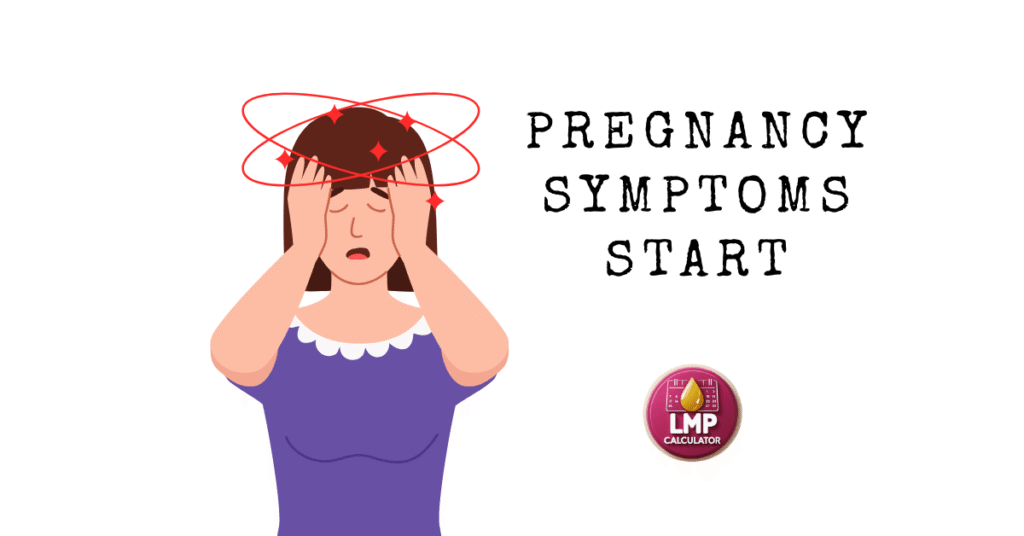Author & Reviewer Dr. Anuja Dokras, MBBS, DNB (Obs & Gynae)
Oxford-trained specialist in Infertility & Women’s Health.
Founder of LMP Calculator.
“This is perhaps one of the most frequently asked questions: ‘When will I start to feel pregnant?’ The answer can be slightly different for every woman, but the science behind it is the same. This guide will help you understand the biological process that governs when symptoms begin.”
Introduction: What is the Single Biggest Factor for Symptoms to Start?
The onset of pregnancy symptoms depends on one crucial event: Implantation.
What is Implantation? It is the process where the fertilized egg (embryo) attaches itself to the wall of the uterus. Until this happens, your body does not “know” it is pregnant, and therefore, it doesn’t produce the specific pregnancy hormones that cause symptoms.
So, the real answer to the question, “When do pregnancy symptoms start?” is: After implantation.
Part 1: The Timeline of Symptoms
Let’s understand this process step-by-step so you know what to expect and when.
Phase 1: From Fertilization to Implantation (0 to 6-12 Days)
- What Happens During This Time: After ovulation, the egg is fertilized and travels from the fallopian tube to the uterus. This entire journey takes about 6 to 12 days.
- Symptoms: During this period, there are no real pregnancy symptoms. Anything you might feel (like fatigue or breast soreness) is due to the rise in the hormone progesterone after ovulation, which is part of your normal menstrual cycle.
Expert Opinion – Dr. Anuja Dokras: “Scientifically, it is not possible to feel pregnancy symptoms before implantation. At this stage, the embryo is not connected to your bloodstream, so there are no hormonal changes in your body that would signal a pregnancy.”
Phase 2: The Moment of Implantation (6-12 Days After Fertilization)
- What Happens During This Time: The embryo embeds itself into the uterine wall.
- The Earliest Possible Symptoms: This is the very first moment you might feel something. Some women experience:
- Light Spotting (Implantation Bleeding): A few pink or brown spots.
- Mild Cramping (Implantation Cramping): A light pricking or pulling sensation in the abdomen.
- Please Note: These symptoms are not very common, and many women do not experience them at all.
Phase 3: After Implantation (When Real Symptoms Begin)
- What Happens During This Time: Immediately after implantation, the body starts to produce hCG (Human Chorionic Gonadotropin)—the ‘pregnancy hormone.’ This hormone level doubles every 48-72 hours.
- The Onset of Symptoms: It takes a few days for hCG levels to rise high enough for you to feel their effects. Therefore, for most women, pregnancy symptoms begin to appear around the time of their missed period, which is typically the fourth week of pregnancy (about 2 weeks after fertilization).
Part 2: A Quick Summary of When Symptoms Start
- Earliest Possible Symptoms (Not everyone gets them): 6-12 days after fertilization (light spotting or cramping during implantation).
- Most Common Early Symptoms:12-14 days after fertilization, which is around the time of the missed period (Week 4). These symptoms include:
- Fatigue
- Breast soreness or heaviness
- Bloating
- More Obvious Symptoms (like Morning Sickness): These often start a little later, typically around the 5th or 6th week of pregnancy.
Part 3: Why is Every Woman’s Experience Different?
It’s important to remember that every woman and every pregnancy is unique. Some women are very sensitive and may notice changes right after implantation, while others may not feel anything until they are 5-6 weeks along. Some reasons for this include:
- Sensitivity to Hormones: Every woman’s body reacts differently to hormones.
- Previous Pregnancies: Women who have been pregnant before may recognize the symptoms earlier.
- Awareness of Symptoms: Women who are actively trying to conceive are often more in tune with their bodies.

Conclusion: What is the Most Reliable Sign?
Dr. Anuja Dokras’s Final Message:“While it can be exciting to look for early symptoms, they are not a confirmation of pregnancy. The onset of symptoms is usually around the time of your missed period, but the most reliable and definitive signs are a missed period followed by a positive pregnancy test. Instead of waiting for symptoms, wait for your expected period date and then take a test for confirmation. This will give you the most accurate answer.”
Disclaimer: This article is for general informational purposes only and should not be considered a substitute for professional medical advice. Always consult your doctor or another qualified health provider with any health concerns.
